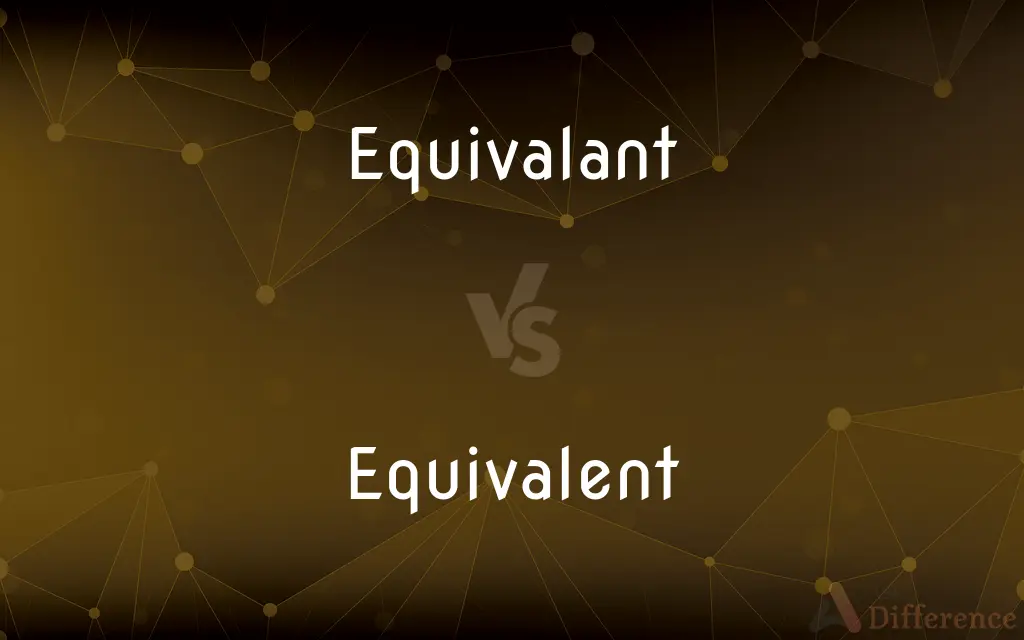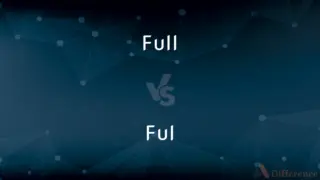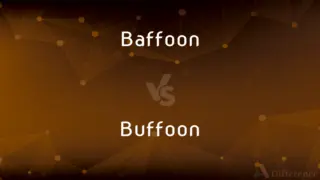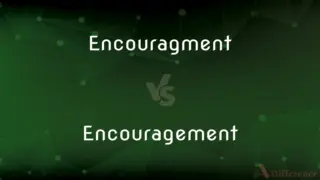Equivalant vs. Equivalent — Which is Correct Spelling?
By Tayyaba Rehman — Updated on March 22, 2024
"Equivalant" is an incorrect spelling. The correct spelling is "Equivalent," which means equal in value, amount, function, or meaning.

Table of Contents
Which is correct: Equivalant or Equivalent
How to spell Equivalent?

Equivalant
Incorrect Spelling

Equivalent
Correct Spelling
ADVERTISEMENT
Key Differences
Remind yourself that "Equivalent" has two "e"s and no "a" after "quiv."
Link "Equivalent" to its use in math, where precision in spelling is key.
Remember "Equivalent" has "quiv" in the middle.
Think of "equi-" prefix meaning equal, as in equilateral or equilibrium.
Associate "Equivalent" with the idea of two things being "equal."
ADVERTISEMENT
How Do You Spell Equivalent Correctly?
Incorrect: The foreign currency's value was equivalant to fifty dollars.
Correct: The foreign currency's value was equivalent to fifty dollars.
Incorrect: One meter is equivalant to approximately 3.28 feet.
Correct: One meter is equivalent to approximately 3.28 feet.
Incorrect: Finding an equivalant replacement part proved difficult.
Correct: Finding an equivalent replacement part proved difficult.
Incorrect: The two products are not equivalant in quality.
Correct: The two products are not equivalent in quality.
Incorrect: Her job in the new company is equivalant to her previous one.
Correct: Her job in the new company is equivalent to her previous one.
Equivalent Definitions
Corresponding in position or function.
Their roles are equivalent in the project.
Being virtually equal or comparable.
His apology was equivalent to an admission of guilt.
Having equal worth or significance.
The two experiences are not equivalent.
Equal in value, amount, function, meaning, etc.
One unit is equivalent to one glass of wine
A person or thing that is equal to or corresponds with another in value, amount, function, meaning, etc.
The French equivalent of the Bank of England
The mass of a particular substance that can combine with or displace one gram of hydrogen or eight grams of oxygen, used in expressing combining powers, especially of elements.
Equal, as in value, force, or meaning.
Having similar or identical effects.
Being essentially equal, all things considered
A wish that was equivalent to a command.
Capable of being put into a one-to-one relationship. Used of two sets.
Having virtually identical or corresponding parts.
Of or relating to corresponding elements under an equivalence relation.
(Chemistry) Having the same ability to combine.
(Logic) Having equivalence
Equivalent propositions.
Something that is essentially equal to another
"The hand is not the biological equivalent of a hammer or a screwdriver.
The hand is a multipurpose tool like a Swiss Army knife" (Jonathan Gottschall).
(Chemistry) Equivalent weight.
Similar or identical in value, meaning or effect; virtually equal.
To burn calories, a thirty-minute jog is equivalent to a couple of hamburgers.
(mathematics) Of two sets, having a one-to-one correspondence.
(mathematics) Relating to the corresponding elements of an equivalence relation.
(chemistry) Having the equal ability to combine.
(cartography) Of a map, equal-area.
(geometry) Equal in measure but not admitting of superposition; applied to magnitudes.
A square may be equivalent to a triangle.
Anything that is virtually equal to something else, or has the same value, force, etc.
(chemistry) An equivalent weight.
(transitive) To make equivalent to; to equal.
Equal in worth or value, force, power, effect, import, and the like; alike in significance and value; of the same import or meaning.
For now to serve and to minister, servile and ministerial, are terms equivalent.
Equal in measure but not admitting of superposition; - applied to magnitudes; as, a square may be equivalent to a triangle.
Contemporaneous in origin; as, the equivalent strata of different countries.
Something equivalent; that which is equal in value, worth, weight, or force; as, to offer an equivalent for damage done.
He owned that, if the Test Act were repealed, the Protestants were entitled to some equivalent. . . . During some weeks the word equivalent, then lately imported from France, was in the mouths of all the coffeehouse orators.
That comparative quantity by weight of an element which possesses the same chemical value as other elements, as determined by actual experiment and reference to the same standard. Specifically: (a) The comparative proportions by which one element replaces another in any particular compound; thus, as zinc replaces hydrogen in hydrochloric acid, their equivalents are 32.5 and 1. (b) The combining proportion by weight of a substance, or the number expressing this proportion, in any particular compound; as, the equivalents of hydrogen and oxygen in water are respectively 1 and 8, and in hydric dioxide 1 and 16.
A combining unit, whether an atom, a radical, or a molecule; as, in acid salt two or more equivalents of acid unite with one or more equivalents of base.
To make the equivalent to; to equal; equivalence.
A person or thing equal to another in value or measure or force or effect or significance etc;
Send two dollars or the equivalent in stamps
The atomic weight of an element that has the same combining capacity as a given weight of another element; the standard is 8 for oxygen
Equal in amount or value;
Like amounts
Equivalent amounts
The same amount
Gave one six blows and the other a like number
An equal number
The same number
Being essentially equal to something;
It was as good as gold
A wish that was equivalent to a command
His statement was tantamount to an admission of guilt
Equal in value, amount, or meaning.
Four quarters are equivalent to one dollar.
Having the same effect or outcome.
The generic drug is equivalent to the brand-name version.
Equivalent Meaning in a Sentence
The chef used an equivalent amount of honey in place of sugar.
The equivalent grade in the American system is an "A".
The two studies reached equivalent conclusions about the treatment's effectiveness.
Offering an apology is not always equivalent to admitting guilt.
The price of this model is equivalent to that of the competitor's.
The mathematical symbol for equivalent is ≡.
In chemistry, equivalent weight refers to the mass of one equivalent of a substance.
Five kilometers is roughly equivalent to 3.1 miles.
The company offered him a position equivalent in rank to his current one.
The horsepower of this engine is equivalent to that of a much larger, older model.
The new regulation is equivalent to a ban on smoking in public areas.
A two-year work experience is seen as equivalent to a master's degree in some fields.
In legal terms, a "nolo contendere" plea is equivalent to pleading guilty in criminal court.
The capacity of the stadium is equivalent to the population of a small city.
For vegetarians, tofu is often used as an equivalent to meat in recipes.
Completing the marathon is equivalent to running over 200 laps on a standard track.
Being wealthy is not equivalent to being happy.
An ounce of gold is equivalent in value to many times its weight in silver.
The qualifications from our country are equivalent to those recognized internationally.
The workload of the new project is equivalent to that of two smaller projects combined.
Eating five servings of fruits and vegetables a day is equivalent to the recommended daily intake.
The risk of smoking 20 cigarettes a day is equivalent to the risk of severe air pollution exposure.
The energy produced by burning 1 kg of coal is equivalent to that from 2 kg of wood.
The term "football" is equivalent to "soccer" in many countries.
In digital storage, a gigabyte is equivalent to 1,024 megabytes.
Common Curiosities
What is the verb form of Equivalent?
There isn't a direct verb form for "Equivalent."
What is the root word of Equivalent?
"Equi-" meaning equal.
Which vowel is used before Equivalent?
The vowel "e."
What is the plural form of Equivalent?
"Equivalents."
Is Equivalent a negative or positive word?
Neutral. It denotes equality.
Why is it called Equivalent?
From Latin "aequivalent-" meaning "having equal power or force."
What is the singular form of Equivalent?
"Equivalent."
What is the pronunciation of Equivalent?
/ɪˈkwɪvələnt/.
Which preposition is used with Equivalent?
"to" as in "equivalent to."
Is Equivalent an adverb?
No.
Is Equivalent an abstract noun?
Yes, when referring to an idea or quality.
Is Equivalent a collective noun?
No.
Is Equivalent a noun or adjective?
Both. It can be a noun or an adjective depending on usage.
Which conjunction is used with Equivalent?
Any conjunction can be used based on sentence structure, e.g., "and" or "but."
Which article is used with Equivalent?
Both "an" and "the" can be used, e.g., "an equivalent amount" or "the equivalent."
Is Equivalent a vowel or consonant?
"Equivalent" is a word, not a single letter.
Is the word Equivalent a gerund?
No.
How many syllables are in Equivalent?
Four.
What is the second form of Equivalent?
N/A as "Equivalent" is not a verb.
How is Equivalent used in a sentence?
"The two products are equivalent in quality and performance."
Is Equivalent a countable noun?
Yes, when referring to things or units (e.g., equivalents).
Is the word Equivalent imperative?
No.
How do we divide Equivalent into syllables?
E-quiv-a-lent.
What is another term for Equivalent?
Analogous or equal.
What is the first form of Equivalent?
N/A as "Equivalent" is not a verb.
Is the Equivalent term a metaphor?
No, but can be used metaphorically.
Is the word “Equivalent” a Direct object or an Indirect object?
It can serve as either based on the sentence, e.g., "She found an equivalent (direct object)."
What is a stressed syllable in Equivalent?
The second syllable, "quiv."
What part of speech is Equivalent?
It can be a noun or an adjective.
What is the opposite of Equivalent?
Unequal or different.
Which determiner is used with Equivalent?
"This," "that," "an," etc., depending on context.
What is the third form of Equivalent?
N/A as "Equivalent" is not a verb.
Share Your Discovery

Previous Comparison
Full vs. Ful
Next Comparison
Baffoon vs. BuffoonAuthor Spotlight
Written by
Tayyaba RehmanTayyaba Rehman is a distinguished writer, currently serving as a primary contributor to askdifference.com. As a researcher in semantics and etymology, Tayyaba's passion for the complexity of languages and their distinctions has found a perfect home on the platform. Tayyaba delves into the intricacies of language, distinguishing between commonly confused words and phrases, thereby providing clarity for readers worldwide.













































